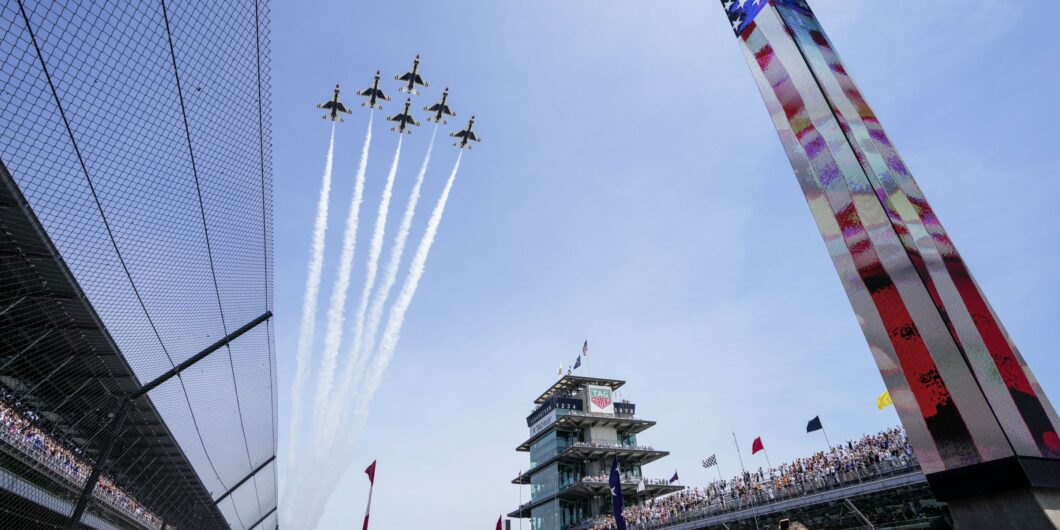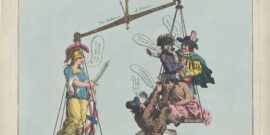“On the Balance of Power” recognizes that just causes are often pushed too far.
America’s Funeral Games
Why would the world’s best-attended annual single-day sporting event devote a substantial amount of time, attention, and pageantry to remembering the US’s fallen military personnel? Festivities at the Indianapolis 500, which always takes place on Memorial Day weekend, include an American Legion memorial service featuring a military funeral procession and wreath laying, a military official delivering memorial remarks, a pre-race invocation remembering the dead, the singing of “The Star-Spangled Banner,” and the playing of “Taps” with a military aircraft flyover executing the missing man formation. This pairing of athletics and memorial services is nothing new. In fact, it stretches far back into antiquity.
Perhaps the most remarkable example is found in Book 23 of Homer’s Iliad, where Achilles, the Greek hero, organizes funeral games in honor of his friend, the recently fallen Patroklos. To prepare for the deceased warrior’s passage to the afterlife, Achilles holds a grand feast, committing his body to the funeral pyre, along with two of his dogs and “twelve noble sons of the great-hearted Trojans.” As prizes for the games, he offers his friend’s most precious possessions, to be awarded to victors in contests including boxing, wrestling, foot racing, archery, and a chariot race, a forerunner of today’s motorsports.
According to classicist James Redfield, such funeral games, thought by some to be the origin of the Olympic games, serve multiple functions. One is to remember the fallen, a universal human concern that seeks expression in forms that transcend lifeless monuments. By staging athletic games, the dead are memorialized through the competitive striving of the living, a form of drama that continues to transfix human beings down to the present day. In fact, 27 of the top 30 telecasts in US history are Super Bowls.
Funeral games also assert the persistent vitality, order, and unity of the community, despite its battle losses. The great numbers of people attracted to sporting events, parades, and memorial services remind us that, though losses have been great, it is still possible to assemble a mighty throng of those who want to witness a full display of the virtues necessary for both conflict and competition. Consider Homer’s wily Odysseus, who is not the strongest or the fastest but the most artful, embodying the principle that “It is not the strength but art that obtains the prize, and to be swift is less than to be wise.” Much the same might be said of character excellencies such as courage, dedication to comrades, and the determination to prevail.
Funeral games also offer an opportunity to cleanse and purify those who have participated in battle, an experience shared by the many spectators at sporting events, including the Indy 500. The fallen may have made the ultimate sacrifice, but survivors harbor wounds of their own, including distress over the fact that they survived while others did not, sometimes referred to as survivor’s guilt. The same applies to the relatively hazardous sport of motor racing. Remarks at the race typically pay homage to the individuals who have lost their lives in the sport, a list that includes track personnel, spectators, and 42 deceased drivers.
Freedom was purchased with the blood of patriots, men and women who regarded the defense of life, liberty, and the pursuit of happiness as so important that they were prepared to lay down their lives for it.
Finally, funeral games and other sporting events allow us to compete under communally sanctioned conditions, usually without loss of life or limb. Combatants can be reintegrated into the community, and virtues necessary for the nation’s defense can be safely cultivated. Although no blood is spilled, forms of physical prowess such as speed and strength as well as excellencies of character such as courage and honor receive full expression. The competition itself can be fierce, yet glory can be garnered without necessarily besmirching the reputations of others. In the funeral games Achilles organizes, both victors and also-rans receive prizes.
When those gathered at such an event pause for a moment of silence, they pay respect to something vital. They are recalling that their liberties were not handed to their ancestors on a silver platter but instead needed to be fought for, not only on the battlefield but also in the realm of ideas. Their freedom was purchased with the blood of patriots, men and women who regarded the defense of life, liberty, and the pursuit of happiness as so important that they were prepared to lay down their lives for it. And such defense is never a one-off. While Americans hope that their children and grandchildren will never know war, they must never become complacent about the defense of long-cherished liberties.
Tocqueville recognized that the United States, vast and surrounded on both sides by oceans and populated by liberty-loving people who arrived on its shores in flight from tyranny, would never fall to external conquest. But fall it could, if not from external pressure, then from internal rot. Specifically, he worried about what he called soft despotism, the possibility that the denizens of the United States would become so enthralled by material comforts and so wrapped up in the micro-concerns of their own lives that they would cease to develop themselves as citizens, lose all sense of community and shared purpose, and eventually collapse of their own dead weight, prey to demagoguery.
Lincoln knew this danger well. His own most notable call to commemorate the fallen reminded his fellow citizens of what they were defending. In his 1863 Gettysburg address, in words that should reverberate in memory as the Air Force’s Thunderbirds roar over crowds at the Indy 500, he wrote:
It is for us the living to be dedicated to the unfinished work which they who fought here have thus far so nobly advanced. It is for us to be dedicated to the great task remaining before us—that from these honored dead we take increased devotion to that cause for which they gave the last full measure of devotion—that we highly resolve that these dead shall not have died in vain—that this nation, under God, shall have a new birth of freedom—and that government of the people, by the people, for the people, shall not perish from the earth.
Fortunately, the large number of American lives lost during the Civil War has never been approached in any subsequent conflict, and the nation’s citizens have benefitted from long stretches of relative peace. Yet vigilance in the preservation of liberty must never falter, and sporting events such as the Indy 500, by reminding spectators of the sacrifices made on their behalf, help to keep this mission top of mind. Now no less than in ancient times, pausing to remember the fallen at the same time we celebrate sporting prowess clarifies purposes and galvanizes dedication to the things most worth defending—that Americans will continue to enjoy the liberties in whose defense so many brave souls have fallen.



